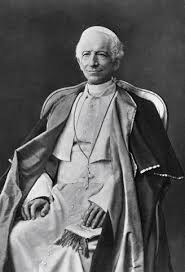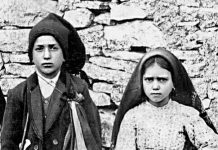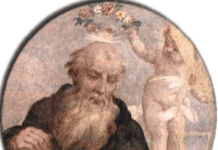(During this time of crisis, and on this day when we have asked to pray and fast for world peace, we thought we would re-post this piece by Father Scott Murray, on the benefits of the Rosary on this memorial. I did not realize that Leo XIII’s estimated ’88 encyclicals’ are the same number as keys on a piano, a veritable symphony, if you will. Anon, lege et orate, fratres et sorores….Editor)
Pope Leo XIII was, undoubtedly, a prolific writer of encyclicals. During his 25 year pontificate he wrote a total of 88 encyclicals. Leo wrote on diverse topics such as Church and State relations, education, socialism, Freemasonry, marriage, slavery, and the saints. His most frequent topic, however, was Marian devotion and the Rosary. The first of his eleven encyclicals dedicated to Our Blessed Mother was penned in 1883, Supremi Apostolatus Officio, and it gives a brief history of the Rosary, a defence of its merits, and a strong exhortation to pray it faithfully. He declares, “It has always been the habit of Catholics in danger and in troublous times to fly for refuge to Mary, and to seek for peace in her maternal goodness” (SAO, 2). The primary goal of these encyclicals is to promote the Rosary, through which the faithful will grow closer to Mary, and through Mary, Jesus.
The Pope repeats five themes in each of the encyclicals: The Church is facing troubling times, the Rosary is a powerful weapon with many benefits, he has experienced the benefits of the Rosary in his own life, history testifies to the power of the Rosary, and we need to pray it more often. None of the encyclicals, however, is a comprehensive treatise on devotion to the Rosary. The longest is only ten pages and the shortest is a mere two pages. They were each published in September to exhort the bishops to promote October devotion to the Rosary among their faithful. Although each is a worthwhile read, one doesn’t need to read them all to understand Leo’s position. My recommendation would be to read Magnae Dei Matris (36 paragraphs) and Laetitiae Sanctae (19 paragraphs) because they are the most comprehensive, they offer beautiful reflections on the meaning of the Rosary and devotion to Our Lady, and they outline a number of practical benefits to praying the Rosary.
What follows isn’t an exhaustive list of the insights contained in Leo’s Marian encyclicals. They are a summary of the benefits of praying the Rosary. They aren’t in any order of preference or importance. Some of them are repeated in each of the encyclicals and others are only mentioned once or twice. They are all worth praying for.
- We become more like Christ when we entrust ourselves to His Blessed Mother because we follow His example and we listen to His words. The Second Person of the Most Holy Trinity assumed a human nature through Mary. He chose to become Her child, and so we should also. From the cross, He also told St. John to take Her into his home (cf. Jn 19:26-27). In his second last Marian encyclical, Augustissimae Virginis Mariae, Leo writes, “Greatly rewarded indeed shall We be, if Our exhortations succeed in making even one of the faithful hold nothing dearer than devotion to Mary; so that those words which St. John wrote about himself may be applied to each, ‘the disciple took her to his own’” (AVM, 3).
- Victory over heresies. The first example that Leo uses to illustrate the power of the Rosary is St. Dominic’s spiritual campaign against the Albigensians. He says, “Thanks to this new method of prayer – when adopted and properly carried out as instituted by the Holy Father St. Dominic – piety, faith, and union began to return, and the projects and devices of the heretics to fall to pieces” (Supremi Apostolatus Officio, 3).
- Victory in war. The second example of the Rosary’s merit that Leo uses is the victory over the Turkish armada at the Battle of Lepanto: “At that time the Supreme Pontiff, St. Pius V., after rousing the sentiment of a common defence among all the Christian princes, strove, above all, with the greatest zeal, to obtain for Christendom the favour of the most powerful Mother of God” (SAO, 4). The Christian forces were victorious over the Muslim invaders and the date of the battle was dedicated by Pope St. Pius V to Our Lady of Victory. The date is now celebrated as Our Lady of the Rosary.
- Increase in the Theological Virtues. Meditating upon the mysteries of the Rosary induces us to make acts of faith in the veracity of the events being meditated upon, compels us to hope for a share in the glory that has already been bestowed upon Our Blessed Mother, and stirs our hearts to love the One whose love is revealed so beautifully in each of the mysteries. Leo states, “If we, with her powerful help, should dedicate ourselves wholly and entirely to this undertaking, we can portray at least an outline of such great virtue and sanctity, and reproducing that perfect conformity of our lives to all God’s designs which she possessed in so marvelous a degree, we shall follow her into heaven” (MDM, 26).
- Growth in moral virtue. Leo reflects on numerous ways in which the Rosary helps to cultivate moral virtue. In Laetitiae Sanctae, for example, he offers an extended reflection on how the Rosary counters three insidious vices of the day: dislike of simplicity, repugnance to suffering, and forgetfulness of the future life (cf. LS, 4-15). The Rosary succeeds in banishing these vices by cultivating the opposite virtues. Leo explains that when we meditate upon the mysteries of the Rosary each has unique benefits in the moral life.
- Help against physical afflictions. Whether it’s a cholera epidemic spreading across the country (cf. Superiore Anno, 3) or the afflictions of old age, Mary wants to help us: “Throughout the many dreadful events of every kind which the times have brought to pass, always with her have We sought refuge, always to her have We lifted up pleading and confident eyes” (Magnae Dei Matris, 2).
- Indulgences. The Pope ends each of the encyclicals with the reminder that there is a plenary indulgence available for those who pray the Rosary and fulfill the other requirements of an indulgence. In his final Marian encyclical, Diuturni Temporis, he states, “It remains to be added that great value and utility accrue to the Rosary from the abundance of privileges and favours which adorn it, and more particularly from the rich treasures of indulgences attached to it. It is evident how greatly to the advantage of all who are solicitous for their eternal salvation is the obtaining of these benefits” (DT, 5). He continues, “For it is a question of obtaining either totally or partially a remission of the debt of temporal punishment which, even after guilt has been forgiven, must be paid either in this life or in the next” (DT, 5).
- We become spiritual warriors. Leo often uses the image of Catholics in prayer being warriors and the Rosary is one of our most powerful weapons (cf. Octobri Mense, 2, AVM, 8). In Augustissimae, he gives an epic description of the army formed by those who join the Rosary Sodality: “The Rosary unites together all who join the Sodality in a common bond of paternal or military comradeship; so that a mighty host is thereby formed, duly marshalled and arrayed, to repel the assaults of the enemy, both from within and without” (AVM, 8).
- The Rosary increases the efficacy of our prayer. Mary is the Mediatrix of all graces, which means that God bestows all graces through Her, so it is fitting that our prayers should be directed through Her to God (cf. Adiutricem, 8). Leo also tells us, “prayer derives its chief efficacy from two principal circumstances: perseverance, and the union of many for one end” (Fidentem Piumque Animum, 2). He explains that the Rosary fulfills both conditions beautifully because its repetitious nature necessitates that we persevere in beseeching Mary’s aid, and the numerous confraternities dedicated to praying the Rosary means we are always intentionally joined to others in our recitation of the Rosary.
- The Rosary inspires us to do holy penance. Penance is a necessary part of the Christian life. It unites us to Christ in His suffering, makes atonement for past sins, and builds virtue. The Pope exhorts us, “practice [prayer and penance] combined” (OM, 11). Likewise, in a reflection on the power of meditating upon the sorrowful mysteries of the Rosary he says, “Witnessing these examples of fortitude, not with sight but by faith, who is there who will not feel his heart grow warm with the desire of imitating them” (LS, 8)?
- It promotes a true unity between Christians. Because Mary is a loving Mother, she desires to draw together all those who love Her Son. Looking back to the Council of Ephesus, (431 A.D., which proclaimed Mary as truly Theotokos, the Mother of God, against the Nestorian heresy) Leo reminds us that Our Lady helped to unite East and West in a time of great difficulty (cf. Adiutricem, 17). He also looks to the example of the Apostles gathered together with the Blessed Mother in anticipation of the coming of the Holy Spirit. He says, “Wherefore as the nascent Church rightly joined itself in prayer with her as the patroness and most excellent custodian of Unity, so in these times is it most opportune to do the same all over the Catholic World” (FPA, 6).












